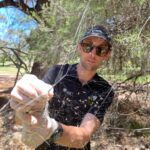Curtin University will lead 17 Australian universities in a project designed to ensure innovative simulation training and technologies are incorporated into physiotherapy clinical education across the country.
The two-year project, funded by Health Workforce Australia, will see Curtin work collaboratively with universities in five states and the Australian Capital Territory.
The project will involve using simulation-based techniques to deliver clinical training in the cardiorespiratory, neurological and musculoskeletal physiotherapy fields to more than 2000 physiotherapy students across the nation.
Professor Tony Wright and Dr Penny Moss, from Curtin’s School of Physiotherapy and Exercise Science, will guide the multi-million dollar project.
Professor Wright said the consortium was working in partnership to implement best practice simulation training into physiotherapy education programs across the country.
“Although simulation has been used in educating physiotherapy students at both undergraduate and postgraduate levels across Australia for a number of years, its use in clinical training has been quite limited,” Professor Wright said.
“We want to introduce more simulation-based learning into university physiotherapy degrees and at an advanced level, because there are many benefits to this type of learning.
“Simulation-based training gives students the opportunity to refine their knowledge and skills before they practise in real-life patient settings.
“They gain confidence and competence in their ability to perform clinical skills without putting actual patients at risk, and it enables students to deal with challenging clinical situations in a supportive environment.”
The initial stages of the project will include filming of physiotherapist/patient interactions and scripting the interactions for later portrayal by role-play actors presenting as simulated patients. Cases in the cardiorespiratory field will also include the use of mannequins. The scenarios will be shared across all of the participating universities.
The development builds on the work carried out in a large Australian Research Council funded linkage project that was a partnership between seven universities including Curtin.
All participating universities will work collaboratively with students, educators and clinical partners to implement best simulation practices during 2014.The project will be comprehensively evaluated with the results being available in 2015.
“The aim is to embed simulation-based training as a component of physiotherapy clinical education in courses right across the country,” Professor Wright said.
“It will provide physiotherapy schools with experience in implementing simulation as a learning technique and the necessary equipment and infrastructure to sustain simulation-based training in future years.”


